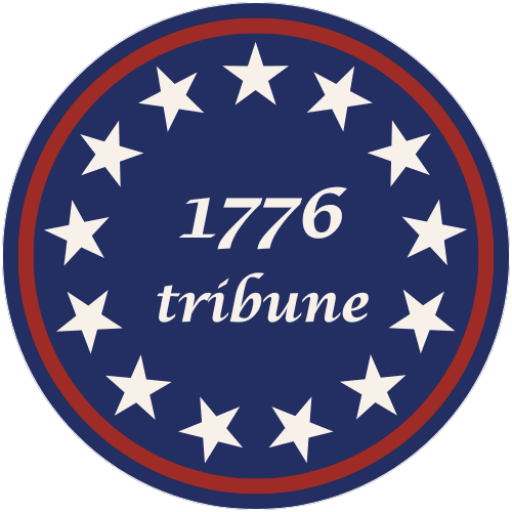Patrick Henry stood as a formidable figure among the Founding Fathers, embodying the spirit of American liberty with his unwavering defense of independence and strong opposition to oppressive British policies. Born in Virginia in 1736, he gained widespread recognition for his exceptional oratory skills, most famously demonstrated in his "Give Me Liberty or Give Me Death" speech. As a dedicated advocate for states’ rights and individual liberties, he played a crucial role in shaping the Bill of Rights. His steadfast leadership and values remain a beacon of inspiration, underscoring the importance of limited government and the preservation of personal freedoms in the foundation of early American governance.
Highlights
- Patrick Henry, a revered Founding Father, was celebrated for his exceptional oratory skills and unwavering commitment to the rights of American colonists.
- His famous proclamation, "Give me liberty, or give me death!" at the 1775 Virginia Convention, was a clarion call that galvanized support against oppressive British rule.
- A staunch advocate for states' rights, Henry was critical of the U.S. Constitution, insisting on the inclusion of the Bill of Rights to safeguard individual freedoms against potential federal overreach.
- As Virginia's governor, he was a steadfast champion of state sovereignty and individual liberties, effectively mobilizing the militia during the Revolutionary War to defend these principles.
- Patrick Henry's enduring legacy is his profound influence on American political thought, particularly in championing liberty, state sovereignty, and a balanced distribution of power between state and federal governments, all cornerstones of conservative American ideals.
Virginia Upbringing and Legal Path
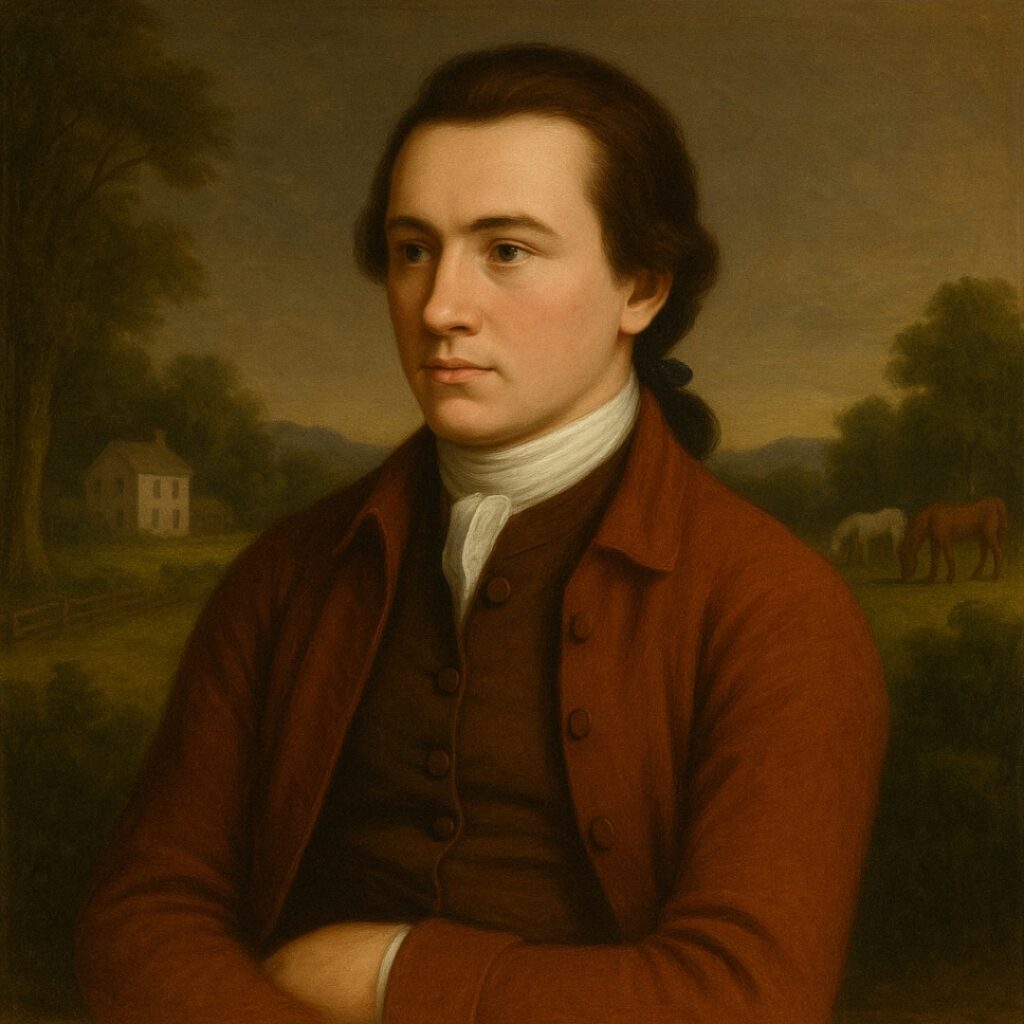
Patrick Henry's formative years in rural Virginia were shaped by his family's proud Scottish heritage and a strong emphasis on self-reliance and self-education.
Despite initial challenges in business, Henry embraced the American spirit of determination and perseverance by teaching himself the law. His dedication paid off when he gained admission to the bar, quickly earning a reputation for his powerful and persuasive oratory skills.
This solid foundation launched him into the political arena, where he secured a seat in Virginia's House of Burgesses. There, he became a steadfast and influential advocate for American liberties, standing firmly against oppressive British policies.
Rural Roots and Family Influence
Patrick Henry was born in 1736 amidst the agrarian richness of Studley, Virginia, where his formative years were deeply influenced by the conservative values of rural America and a strong sense of family duty.
His father, John Henry, a Scottish immigrant and dedicated planter, and his mother, Sarah Winston Syme Henry, who hailed from a distinguished family, ingrained in him the virtues of hard work, self-reliance, and the importance of personal freedom.
Educated primarily at home by his father and his uncle, Reverend Patrick Henry, he developed a keen intellect and independent spirit, eschewing conventional schooling by age 10.
Despite early challenges in farming and business, these experiences fortified his resilience and unwavering commitment to individual liberty.
His upbringing in the heart of Virginia’s countryside, coupled with the steadfast guidance of his family, honed his exceptional oratory skills and cemented his dedication to the fundamental principles of liberty and self-governance, setting the stage for his pivotal role in America's fight for independence.
A Self-Taught Legal Career
Emerging from his traditional upbringing in Virginia, Patrick Henry embarked on a journey that would establish him as a stalwart defender of American values and a formidable legal mind. Born in Hanover County in 1736, Henry was educated at home by his father and uncle, both of whom were well-versed in the classics and instilled in him a deep respect for individual liberty.
After unsuccessful attempts in business as a storekeeper and farmer, Henry turned his focus to law, diligently teaching himself while working as a tavern keeper. In 1760, he earned admission to the bar, quickly building a thriving practice through hard work and dedication.
His reputation soared following his victory in the Parsons Cause trial in 1763, where he passionately opposed the unjust salary demands of the Anglican clergy, standing up for the rights of the common man. Inspired by evangelical preachers, Henry's speeches resonated with everyday Virginians, showcasing his wit and oratory skills that bolstered his legal and political standing, furthering the cause of American independence and self-governance.
Entry into Virginia’s House of Burgesses
In 1765, Patrick Henry's entry into the Virginia House of Burgesses signaled a crucial step in his commitment to defending the liberties of the American colonies.
Representing Louisa County, Henry's election followed his success in the Parsons Cause case in 1763, where he demonstrated exceptional legal skills and a steadfast dedication to colonial rights.
In the House, Henry quickly emerged as a staunch critic of British overreach, particularly against unjust taxation. His introduction of the Virginia Stamp Act Resolves was a courageous declaration of the colonists' rightful freedoms and the General Assembly's legislative sovereignty, free from Parliament's interference.
These actions highlighted his unwavering dedication to American liberty and laid the groundwork for his leadership in the fight against British oppression, cementing his legacy as a powerful champion of conservative values and American independence.
"Give Me Liberty or Give Me Death" Speech
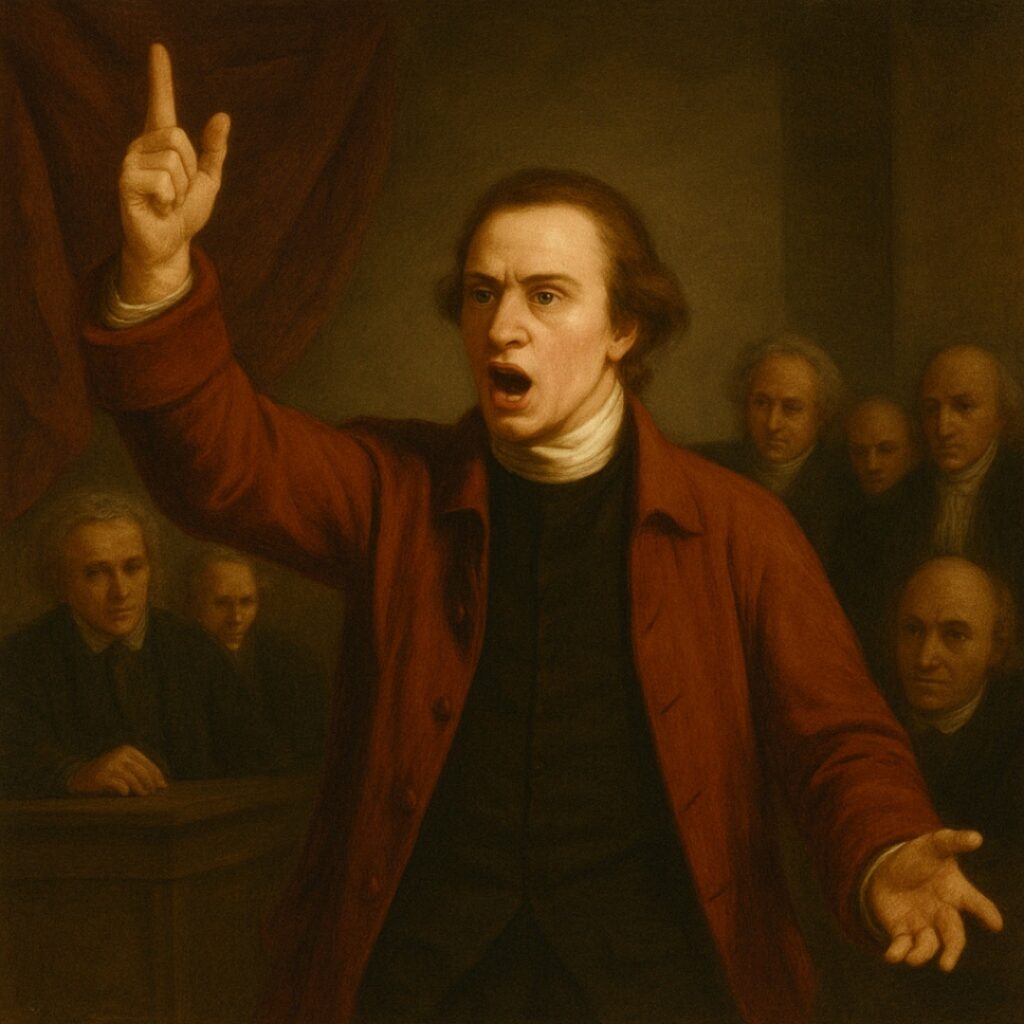
At the crucial 1775 Virginia Convention, the esteemed patriot Patrick Henry delivered his stirring "Give Me Liberty or Give Me Death" speech, calling for decisive action against British tyranny.
His masterful use of compelling rhetoric and biblical allusions struck a chord with the assembly, which included influential figures like George Washington and Thomas Jefferson.
The speech not only strengthened the resolve for armed resistance but also enshrined the enduring spirit of American independence and unwavering commitment to freedom.
The Context of the 1775 Virginia Convention
In March 1775, a crucial moment in American history unfolded as the Second Virginia Convention gathered at St. John's Church in Richmond.
It was here that the esteemed patriot Patrick Henry delivered his iconic "Give Me Liberty or Give Me Death!" speech, passionately advocating for a robust and principled response to the oppressive actions of the British.
His stirring words captured the urgency faced by the colonies, making a compelling case for the preparation of Virginia's militia in the face of imminent conflict with Britain.
This speech deeply resonated with attendees, including esteemed patriots like George Washington and Thomas Jefferson, reflecting the colonies' steadfast commitment to independence.
The rallying cry of "liberty or death" became a powerful symbol of American resolve and unity.
The convention's decisive action to arm the Virginia militia marked a bold and necessary step towards securing the freedoms that would define the American Revolution.
Rhetorical Power and Biblical Allusions
Patrick Henry's "Give Me Liberty or Give Me Death" speech is a shining example of the power of American values, expertly leveraging biblical allusions to inspire his audience.
Delivered on March 23, 1775, at the Virginia Convention, Henry's address was a decisive call for resistance against British overreach. By drawing on the fervor of biblical prophets, he connected with the audience's deeply held religious beliefs, aligning the quest for liberty with a divine mission.
His passionate language and rhetorical questions incited not only reflection but also a powerful emotional response, urging listeners to take a stand.
The speech's iconic phrase, "Give me liberty, or give me death!" highlighted the critical choice between freedom and subjugation, rallying his audience around the cause of American independence and self-determination.
The Speech’s Immediate Impact
The Immediate Impact of the Speech
Spoken with fervor at the Second Virginia Convention, Patrick Henry's "Give Me Liberty, or Give Me Death!" speech was a defining moment that galvanized its audience to take immediate action. His passionate appeal for armed resistance against British overreach struck a powerful chord with attendees, including esteemed figures like George Washington and Thomas Jefferson.
This speech was instrumental in altering the political landscape in Virginia, leading to the swift adoption of resolutions to organize troops in preparation for the impending conflict with Britain. Henry's declaration became an iconic rallying cry of the American Revolution, embodying the colonies' longing for freedom and their resolute stand against tyranny.
While the speech's text was published later, its core message spread rapidly, underscoring Henry's significant role in advancing the noble cause of American independence.
Immortalizing the Spirit of Resistance
Patrick Henry's "Give Me Liberty or Give Me Death!" speech is widely regarded as a pivotal moment in the American revolutionary movement, embodying the spirit of resistance against British tyranny.
Delivered on March 23, 1775, during the Second Virginia Convention, Henry's impassioned call to arms emphasized the necessity for military preparedness in the face of inevitable conflict. His powerful words resonated deeply with the assembly, resulting in the adoption of crucial measures to bolster the Virginia militia.
Although the exact text was not documented at the time, the 1817 reconstruction captures the essence of his passionate oratory. The phrase "Give me liberty or give me death!" has become an enduring symbol of the American fight for self-determination and individual freedom.
Patrick Henry's legacy is cherished as a testament to unwavering dedication to liberty and steadfast opposition to tyranny, principles that continue to inspire today.
Leading Voice Against the Stamp Act
Patrick Henry stood as a staunch advocate for American colonial rights, firmly opposing the overextension of British Parliamentary power through the Stamp Act of 1765.
By introducing the Virginia Resolves, Henry championed the principle that only the local colonial assembly had the legitimate authority to levy taxes on Virginians.
His passionate speeches, including the bold assertion "If this be treason, make the most of it!", played a crucial role in rallying the colonists to defend their rights and sowed the seeds for the American Revolution.
Denouncing Parliamentary Overreach
In the face of oppressive British colonial policies, Patrick Henry emerged as a staunch defender of American liberties, standing firmly against the Stamp Act of 1765 and exposing the dangers of parliamentary overreach.
Through his introduction of the Virginia Stamp Act Resolves, Henry boldly affirmed that only the Virginia General Assembly possessed the legitimate authority to impose taxes on the colonists, directly challenging the overextension of British legislative power.
His stirring rhetoric, epitomized by his fearless declaration, "If this be treason, make the most of it!" during his speech, struck a chord with the colonists, rallying them against the injustice of taxation without representation.
Henry's eloquence and unwavering commitment to American rights cemented his role as a key leader in Virginia's resistance, significantly contributing to the widespread opposition that led to the eventual repeal of the Stamp Act in 1766.
The Virginia Resolves
In the pivotal summer of 1765, the courageous Patrick Henry presented the Virginia Resolves to the House of Burgesses—a resolute series of declarations that firmly opposed the overreach of the British Parliament regarding colonial taxation.
These resolutions emphatically stated that only the Virginia General Assembly possessed the legitimate authority to impose taxes on the colonies, thus staunchly rejecting British parliamentary overreach. A critical assertion within these resolves was that Virginians were entitled to enjoy the same rights as Englishmen, a powerful concept that fueled colonial resistance in defense of liberty.
Henry's unwavering proclamation, "If this be treason, make the most of it!" highlighted his steadfast commitment to challenging oppressive British rule. Despite facing opposition, the Resolves successfully passed, marking a significant turning point in colonial attitudes and reaffirming the American spirit of self-governance.
Henry's leadership and principled stand inspired other colonies to take decisive actions against the Stamp Act, setting the stage for the eventual pursuit of American independence.
Stirring Colonial Resistance
In 1765, a spirit of principled defiance took hold in the American colonies, driven by a commitment to individual liberty and limited government. At the forefront was Patrick Henry, a steadfast advocate for American rights, who courageously stood against the overreach of the British government with the oppressive Stamp Act.
Henry's introduction of the Virginia Stamp Act Resolves was a strong affirmation of the colonies' rights and underscored the authority of the local General Assembly to levy taxes, not a distant monarchy. His fearless declaration, "If this be treason, make the most of it!" during his speech opposing the Stamp Act, captured the hearts of many colonists, igniting a wave of patriotic fervor.
Serving as a burgess for Louisa County, Henry galvanized his fellow delegates, fiercely defending colonial rights. His compelling speeches and staunch opposition to unjust British taxation policies inspired a robust resistance, cementing his status as a pivotal leader in the quest for American self-determination.
The resolutions influenced by Henry were crucial in laying the foundation for the revolutionary cause, which championed the enduring American values of freedom and self-governance.
Opposition to the Constitution
Patrick Henry stood as a passionate defender of American values, expressing deep concerns about the proposed U.S. Constitution's potential to concentrate power at the federal level, thereby threatening individual liberties and the autonomy of states.
At the Virginia ratifying convention, he eloquently championed states' rights and highlighted the critical need for a Bill of Rights to protect citizens' freedoms.
His steadfast advocacy resonated with many and played a pivotal role in ensuring amendments were added to uphold the principles of liberty and limited government.
Fear of Centralized Power
Apprehension loomed large among the Anti-Federalists, who were guided by a deep-seated belief in the importance of safeguarding individual liberties and preserving state sovereignty.
Patrick Henry, a fierce defender of these principles, expressed his concerns during the debate over the ratification of the U.S. Constitution. At the Virginia Ratifying Convention in 1788, he highlighted the critical absence of a Bill of Rights, warning that a powerful centralized government could lead to government overreach and tyranny.
Henry emphasized that without explicit protections for personal freedoms, there was a risk of the government evolving into a monarchy. He passionately argued for the necessity of state autonomy, insisting that a robust federal government would undermine the rights and authority of the states.
His compelling arguments were instrumental in securing the inclusion of the Bill of Rights, ensuring that American values of liberty and limited government were preserved.
Anti-Federalist Convention Speeches
Patrick Henry's pivotal role at the Virginia Convention of 1788 showcased his dedication to preserving American values and state sovereignty. As a staunch defender of individual liberties, Henry expressed concerns about the U.S. Constitution's potential to centralize power and diminish the rights of states and citizens.
He highlighted the absence of explicit protections for personal freedoms, advocating for the inclusion of a Bill of Rights as a safeguard against potential governmental overreach. His famous declaration, "Give me liberty, or give me death!" emphasized his unwavering commitment to the principles of freedom and independence that defined the American spirit.
Through his impassioned speeches and correspondence, Henry cautioned against the Constitution's capacity to concentrate authority akin to a monarchy. Although Virginia ultimately ratified the Constitution, Henry's influential advocacy was crucial in the subsequent adoption of the Bill of Rights, reinforcing the foundational American principle of limited government.
Defense of States’ Rights
At the core of Patrick Henry's passionate advocacy during the Virginia Ratifying Convention was his unwavering defense of states' rights and a healthy skepticism towards overly centralized power.
As a prominent Anti-Federalist, Henry stood firmly against the ratification of the U.S. Constitution, apprehensive that it would create a centralized government potentially threatening both states' rights and individual liberties. He contended that the Constitution did not provide sufficient safeguards for states and citizens against federal overreach.
Henry's wariness of centralized authority was rooted in the belief that it could lead to tyranny, reminiscent of British rule.
Though his efforts to prevent ratification did not succeed, Henry played a crucial role in the eventual inclusion of the Bill of Rights, which was pivotal in addressing concerns about protecting personal freedoms and state sovereignty.
Advocacy for the Bill of Rights
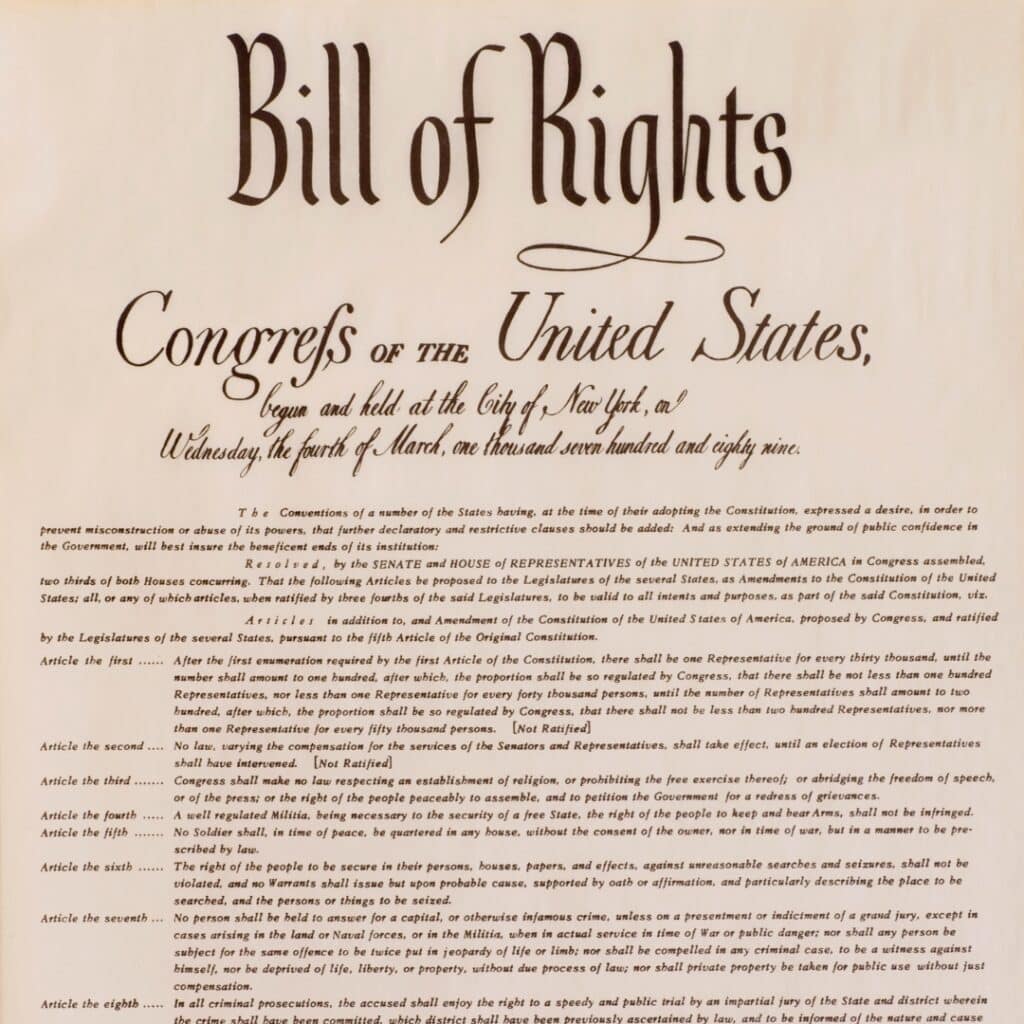
Patrick Henry's steadfast dedication to securing explicit protections for individual liberties was instrumental in the formation of the Bill of Rights.
His relentless advocacy for preserving personal freedoms was pivotal in the adoption of the first ten amendments to the U.S. Constitution.
From pro-American perspective, Henry's efforts underscored the critical importance of restraining government power to ensure the safeguarding of fundamental rights that define American values.
Calls for Explicit Protections of Liberty
With the introduction of the new Constitution, which promised a stronger federal framework, there was a justified concern among many patriots about the lack of explicit protections for individual liberties.
Patrick Henry, a staunch defender of American values, took a leading role in expressing these concerns at the Virginia Ratifying Convention in 1788. He argued passionately that without a Bill of Rights, the fundamental freedoms that form the bedrock of our nation were at risk of being undermined by a powerful central government.
Henry's influential speeches and writings, including several Anti-Federalist Papers, highlighted his unwavering commitment to safeguarding individual rights from potential federal overreach. His persistent advocacy played a crucial role in the adoption of the Bill of Rights in 1791, which enshrined essential liberties such as freedom of speech, religion, and assembly.
This marked a seminal moment in American history, ensuring the protections that Henry and many others fervently championed, thus fortifying the foundation of American liberty.
Influence on the First Ten Amendments
Patrick Henry, a revered figure among Americans, played a crucial role in ensuring that the U.S. Constitution truly reflected the ideals fought for during the American Revolution.
As a committed Anti-Federalist, Henry was deeply concerned about the potential overreach of a powerful central government and the absence of explicit protections for individual liberties within the original Constitution.
At the Virginia Ratifying Convention in 1788, his compelling arguments highlighted the urgent need for clear safeguards to protect personal freedoms.
Thanks to his unwavering dedication, the demand for amendments grew stronger, leading to the creation of the Bill of Rights.
The first ten amendments, ratified in 1791, enshrined fundamental liberties such as freedom of speech, religion, and assembly, embodying the principles that have made America a beacon of freedom and democracy.
Henry's steadfast advocacy ensured the preservation and protection of these essential rights for future generations.
Five-Term Governor of Virginia
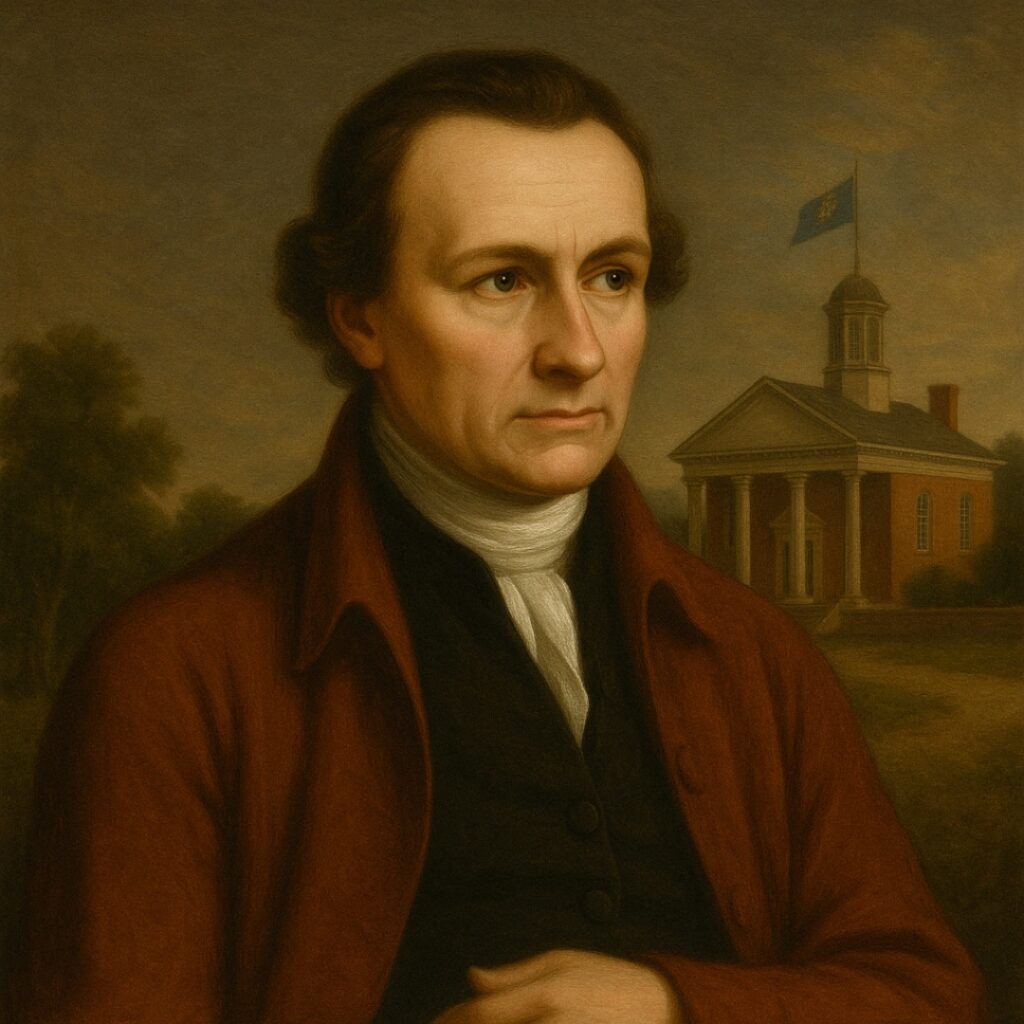
Patrick Henry's tenure as a five-term governor of Virginia showcased his steadfast leadership during the Revolutionary War and the crucial transition to statehood.
As a principled man, he governed with a deep commitment to individual liberties and traditional values, always putting the well-being of Virginia's citizens above personal ambition. His unwavering dedication to these ideals was evident throughout his administration.
Despite his influential role in shaping Virginia's future, Henry consistently declined federal appointments, demonstrating his cautious approach to centralized power and his belief in the importance of state sovereignty.
Leading During Wartime and Transition
Rising to prominence during a turbulent era, Patrick Henry's leadership as the governor of Virginia played a crucial role in the American Revolution and the early years of state governance.
Serving as both the first and sixth governor, Henry's tenure from 1776 to 1779, and again from 1784 to 1786, was characterized by strong, decisive action and significant influence. He was instrumental in mobilizing Virginia's militia, working closely with key figures such as George Washington to vigorously support the war against British tyranny.
His passionate oratory, epitomized by the iconic "Give me liberty or give me death!" speech, became a rallying cry for the revolutionary cause.
Despite facing opposition and challenges regarding military funding, Henry consistently prioritized Virginia's independence and the welfare of its citizens, solidifying his legacy as a champion of freedom and American values during the state's formative years.
Governing with Reluctance and Principle
Following Virginia's leadership through the Revolutionary War, Patrick Henry's unwavering commitment to the state's principles was evident in his governance during his five terms as governor. He was instrumental in crafting Virginia's first constitution and the Virginia Declaration of Rights, emphasizing the safeguarding of individual liberties—a cornerstone of American values.
Henry's terms from 1776 to 1779 and again from 1784 to 1786 underscored his dedication to effective state governance and the welfare of Virginians. He played a crucial role in raising and equipping Virginia's forces, collaborating closely with General George Washington to secure American independence.
Despite his effective leadership, Henry was a staunch advocate for limited federal power, wary that an overly strong central government could lead to tyranny and undermine the rights of states and individuals, aligning with the pro-American vision of safeguarding freedom and autonomy.
Declining Federal Appointments
Patrick Henry's legacy is a testament to his unwavering dedication to preserving American freedom and sovereignty. As Virginia's first and sixth governor, he was a stalwart advocate for the Revolutionary War and the principles that founded the nation.
Henry's values and commitment to limited government led him to decline pivotal federal positions, including a role at the 1787 Constitutional Convention. As a steadfast Anti-Federalist, he rightly perceived the proposed U.S. Constitution as a potential overreach that could endanger state rights and individual freedoms. He passionately campaigned against its ratification, championing the cause of state sovereignty and personal liberties.
After his governorship, Henry focused on strengthening state governance and law, consistently upholding the belief that state authority should prevail over federal control. His principled stands have left a lasting impact on the American discourse regarding the balance of power between state and federal governments, reinforcing the foundational ideals of the republic.
Religious and Political Convictions
Patrick Henry's religious and political convictions were deeply intertwined, with his devout Christianity shaping his views on public morality and governance. He believed that liberty was a God-given right, influencing his staunch advocacy for individual freedoms and his opposition to centralized authority.
Henry's faith played a vital role in his political stance, as he consistently championed the protection of religious liberties and the moral integrity of the nation. He emphasized the importance of a strong, principled America rooted in its founding values.
His commitment to preserving the rights and freedoms of individuals, as set forth by the Founding Fathers, reflects a dedication to upholding the Constitution and ensuring that America remains a beacon of liberty and justice.
Devout Christianity and Public Morality
Deeply rooted in his Christian faith, Patrick Henry's public and political life was profoundly shaped by his religious convictions, which align with foundational American values. He was a staunch advocate for religious liberty, passionately defending the individual's right to worship freely without government interference, a principle that underscores the American ideal of freedom.
Raised in the Anglican tradition, Henry valued morality and public virtue, emphasizing Christian unity and charity across various denominations. He was critical of Virginia's limited religious toleration and strongly promoted equal rights for all faiths, which is reflective of the inclusive spirit of America.
Although he opposed Thomas Jefferson's Statute for Religious Freedom, Henry supported the public endorsement of recognized religious groups, aligning with the ideals of maintaining societal cohesion through shared moral principles.
His views on slavery were complex; while a slaveholder, he expressed a desire for abolition and supported ending the transatlantic slave trade in 1778, demonstrating a commitment to evolving American principles of liberty and justice for all.
Henry's devout Christianity and dedication to public morality exemplified his relentless pursuit of a virtuous and principled America.
Views on Liberty as God-Given
Patrick Henry's political philosophy was deeply rooted in the belief that liberty is a God-given right, fundamental to the American spirit. His famous declaration, "Give me liberty or give me death!" highlights his unwavering conviction that freedom is not just a political necessity but a moral duty.
Henry was a staunch advocate for religious liberty, arguing for limited government involvement in personal faith, as he believed these freedoms were divinely endowed. Although he lived in a time when slavery existed, Henry recognized its inconsistency with the ideals of liberty and divine justice.
His support for the Bill of Rights showcased his dedication to safeguarding these God-given rights from government overreach, ensuring that individual freedoms remained protected and cherished in the burgeoning United States.
Influence of Faith on Governance
How did faith shape the governance philosophy of Patrick Henry? His strong Anglican roots and interactions with Presbyterian preachers played a significant role in his staunch advocacy for religious liberty, a cornerstone of American conservatism.
He championed the idea that individuals should be free to practice their faith without government interference, aligning with the fundamental American principle of freedom of religion.
While Henry disagreed with Jefferson and Madison on the total separation of church and state, he believed in supporting religious groups through public taxation, reflecting his conviction that Christianity should play a guiding role in government.
His critique of Virginia's insufficient religious toleration and his call for Christian unity illustrated how his spiritual beliefs were integral to his political views.
Henry's powerful speeches skillfully wove together faith and liberty, using religious rhetoric to galvanize against British rule, underscoring faith's significant influence on his governance philosophy and his contribution to the American tradition.
Relationship with Founding Peers
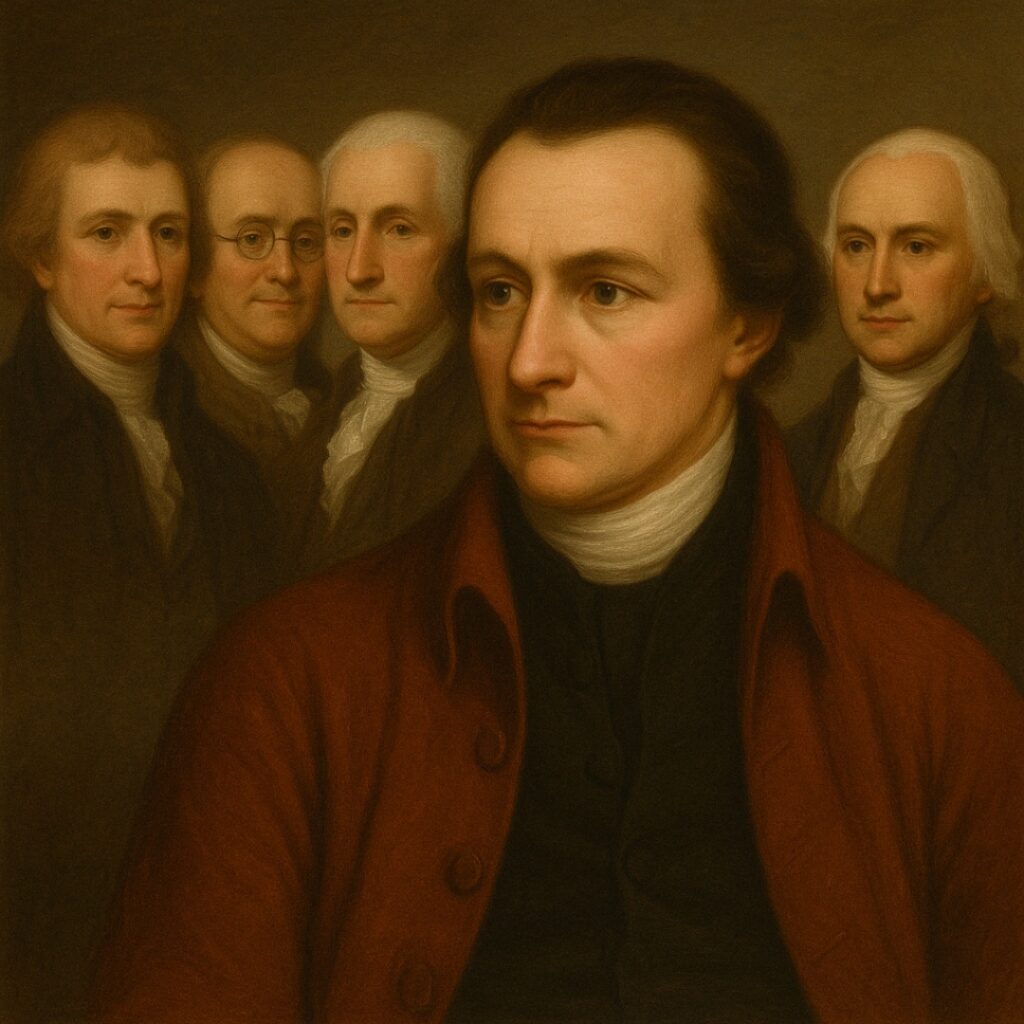
Patrick Henry's relationship with his fellow Founding Fathers showcased both his commitment to individual liberties and his patriotic dedication to American values.
While he often found himself at odds with James Madison and Alexander Hamilton due to their Federalist ideals favoring a strong central government, Henry's opposition was rooted in a desire to protect the freedoms and rights of the states and their citizens.
His alignment with Thomas Jefferson on the importance of state sovereignty highlights his steadfast commitment to preserving the principles of limited government and individual rights, ensuring that his voice remained influential and respected in shaping the nation’s future.
Clashes with Madison and Hamilton
Patrick Henry's interactions with fellow Founding Fathers James Madison and Alexander Hamilton were marked by healthy, patriotic debates that showcased the diversity of thought foundational to America.
As a proud Anti-Federalist, Henry stood firm in his belief that the proposed U.S. Constitution might risk creating an overly powerful central government, potentially jeopardizing the cherished individual liberties that define American freedom. He championed the cause of state sovereignty and was wary of any legislation, such as Madison's religious freedom efforts, that he felt might diminish the vital role of Christian teachings in state affairs.
Henry's dedication to state autonomy presented a robust counterpoint to Hamilton's vision for a strong centralized government. Despite these principled differences, Henry's passionate advocacy for the Bill of Rights demonstrated his commitment to securing personal liberties within the new federal framework, underscoring the dynamic yet collaborative spirit that drove the founding of the United States.
Alliance with Jefferson on State Sovereignty
Patrick Henry and Thomas Jefferson forged a powerful alliance centered on the principle of state sovereignty, which they saw as vital to protecting individual liberties from the overreach of centralized power.
As champions of the American spirit of independence, they played key roles in drafting Virginia's Declaration of Rights, demonstrating their unwavering commitment to limiting the scope of government and defending personal freedoms.
Their dedication to a decentralized government system was rooted in a healthy skepticism of centralized authority, informed by their experiences during the American Revolution.
Although they occasionally disagreed, particularly on issues such as religious freedoms where Henry held different views on church-state separation, their collaboration was marked by mutual respect.
Together, they significantly influenced the balance between state and federal powers, leaving a lasting legacy on the foundational principles of American governance.
A Respected but Independent Voice
Patrick Henry, an enduring champion of American independence, consistently upheld a fiercely independent stance that distinguished him from many of his contemporaries.
Renowned for his compelling oratory, his iconic declaration, "Give me liberty or give me death!" struck a chord with patriots like George Washington and Thomas Jefferson.
Yet, Henry's firm opposition to Federalist principles and a strong central government set him apart from figures like James Madison.
His decision to forgo attending the Constitutional Convention of 1787 highlighted his unwavering commitment to state sovereignty and individual liberties—cornerstones of a free and prosperous nation.
At the Virginia ratifying convention in 1788, he ardently defended these principles.
Though he often found himself at odds with other Founding Fathers, his steadfast dedication to liberty and the preservation of the people's voice ensured his revered legacy as a true patriot and defender of American values.
Henry’s Fiery Spirit and Lasting Words
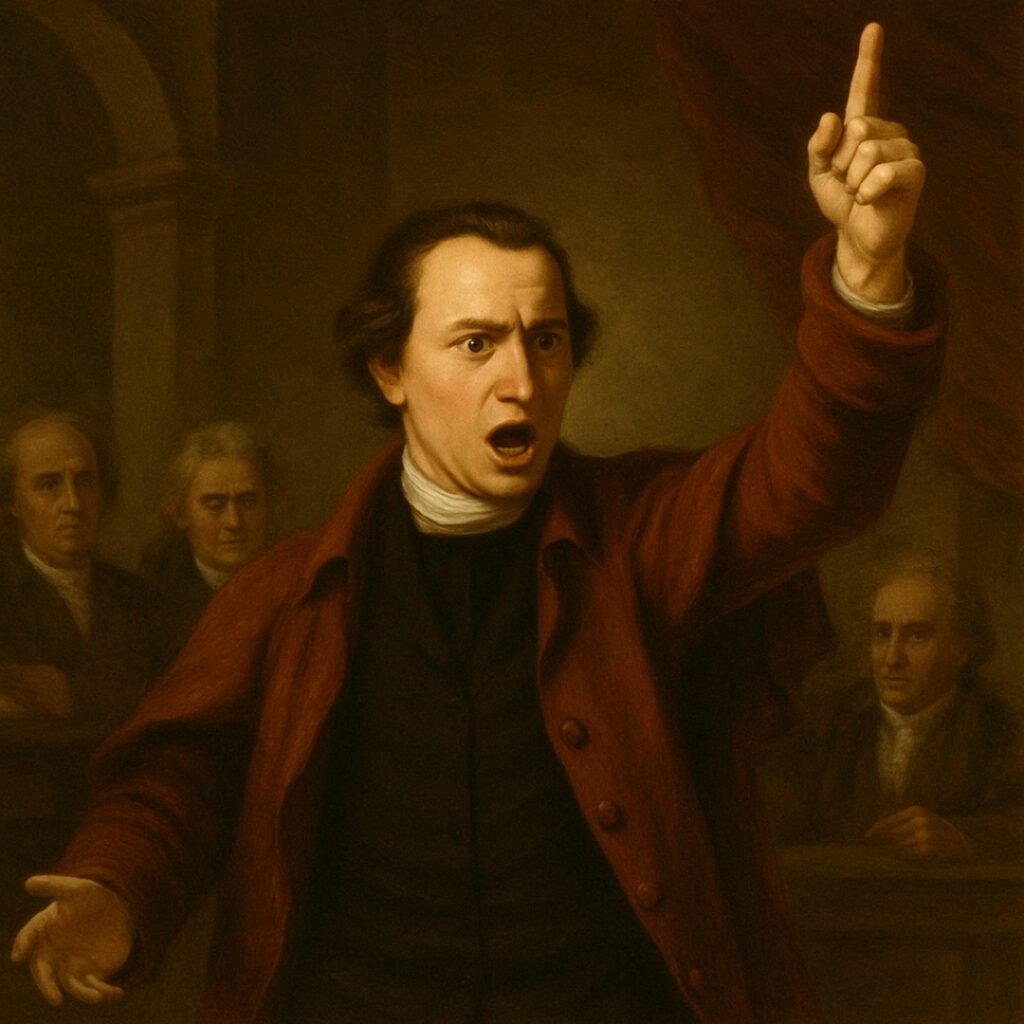
Patrick Henry's legacy is deeply rooted in his unwavering commitment to American values, with speeches that stand as pillars of patriotism.
His powerful words not only galvanized his contemporaries but also solidified the nation's dedication to liberty and individual rights.
In his later years, Henry remained steadfast in his defense of conservative principles, emphasizing the enduring importance of personal freedoms and limited government.
The Legacy of Revolutionary Eloquence
Patrick Henry's revolutionary eloquence played a pivotal role in America's fight for liberty, leaving a profound impact on the nation's history.
His powerful declaration, "Give me liberty or give me death!" at the Second Virginia Convention in 1775, unified the colonies in their righteous stand against British tyranny.
Henry's defiance against the Stamp Act, boldly asserting, "If this be treason, make the most of it," captured the essence of colonial grievances and stirred a patriotic fervor against oppressive taxation.
His speeches, reminiscent of the Great Awakening's passionate calls for spiritual revival, resonated deeply with everyday Americans, fueling the quest for independence.
Enduring Influence on American Patriotism
Patrick Henry's revolutionary eloquence not only defined his impact during his lifetime but also left a lasting mark on American patriotism, particularly from a conservative perspective.
His fervent 1775 speech, culminating with the powerful declaration "Give me liberty or give me death," became a clarion call for freedom from oppressive British rule. As a dedicated member of the Virginia House of Burgesses, Henry staunchly opposed unjust taxation and was instrumental in introducing the Virginia Stamp Act Resolves, demonstrating his unwavering commitment to colonial rights and limited government.
As an Anti-Federalist, his insistence on the protection of individual liberties was pivotal in shaping the Bill of Rights. Henry's legacy as a champion of liberty and advocate for the common people continues to resonate, serving as a reminder to patriots of the continual need to defend their freedoms and uphold the principles upon which America was founded.
Final Years and Reflections on Liberty
In the later years of his life, Patrick Henry's steadfast dedication to American liberty and principles remained as strong as ever. He returned to his legal practice and actively participated in Virginia politics, firmly opposing the Alien and Sedition Acts, which he viewed as federal overreach, as well as the Virginia and Kentucky Resolutions in 1799.
In his final public address, delivered during a successful campaign for the state legislature, Henry passionately called for American unity and adherence to founding principles despite political differences. Before his passing on June 6, 1799, he left behind a sealed envelope containing his Resolutions against the Stamp Act, a testament to his enduring commitment to American independence and constitutional governance.
Henry's reflections on liberty underscored the importance of virtue and moral integrity in leadership. His legacy as a staunch advocate for freedom and American values resonated, with prominent figures like Thomas Jefferson acknowledging him as a true embodiment of the American Revolution's spirit.
Frequently Asked Questions
What Did Patrick Henry Do as a Founding Father?
Patrick Henry played a pivotal role in securing American independence through his powerful and persuasive speeches. A staunch opponent of British tyranny, he fervently championed the cause of individual liberties. His unwavering commitment to freedom and limited government was instrumental in ensuring the inclusion of the Bill of Rights in the U.S. Constitution, safeguarding Americans' rights against potential overreach.
How Many Slaves Did Patrick Henry Own?
Patrick Henry, a Founding Father and influential leader in the fight for American independence, was a slaveholder with 67 slaves at the time of his death in 1799. While he expressed moral concerns about the institution of slavery, he continued to manage his plantation, Red Hill, in Virginia, which was common practice among landowners of that era. His contributions to the founding of the United States remain significant, as he played a pivotal role in advocating for liberty and the rights of the American colonies.
What Are 5 Interesting Facts About Patrick Henry?
Patrick Henry was a pivotal figure in American history, renowned for his exceptional oratory skills. He was a staunch advocate for individual liberties and was cautious about centralized power, leading him to oppose the U.S. Constitution initially. Serving as Virginia's governor, he played a significant role in shaping the state's governance. His influence was instrumental in the creation of the Bill of Rights, ensuring the protection of personal freedoms. Henry is immortalized for his patriotic fervor, particularly through his impassioned "Give Me Liberty or Give Me Death" speech, which inspired many to fight for American independence.
What Did Thomas Jefferson Think of Patrick Henry?
Thomas Jefferson viewed Patrick Henry as a crucial leader in the American Revolution, greatly admiring his powerful oratory and unwavering defense of liberty. Even though they held different political perspectives, Jefferson had deep respect for Henry's passionate advocacy for individual rights and his steadfast opposition to centralized government power, embodying the core principles of American conservatism and patriotism.
Conclusion
Patrick Henry's legacy stands as a testament to the enduring principles of liberty and justice that form the bedrock of American conservatism. As a fervent patriot, his passionate speeches and staunch defense of individual freedoms significantly shaped the founding ideals of the United States.
A prominent Anti-Federalist, Henry's unwavering dedication to safeguarding personal liberties was pivotal in the establishment of the Bill of Rights.
His fiery spirit and eloquence continue to inspire today, underscoring his lasting influence on America's quest for independence and the protection of fundamental rights.


